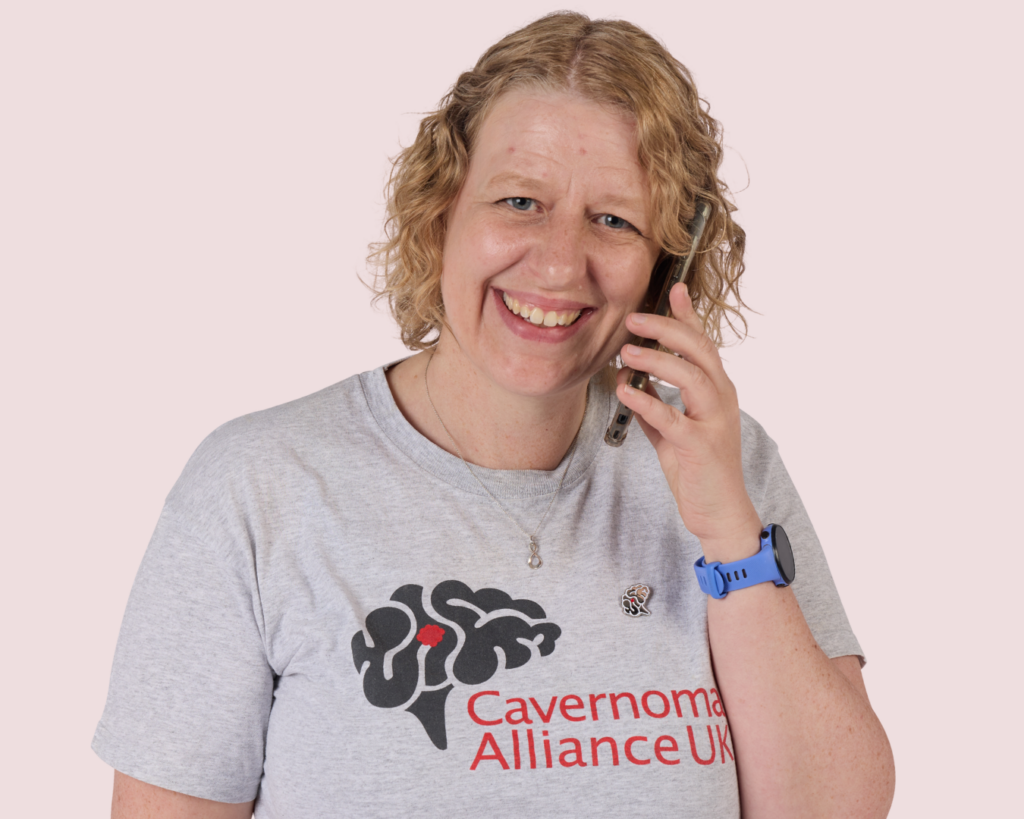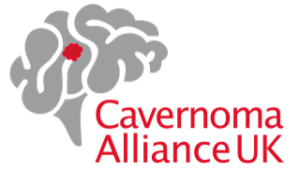Neurosurgery
Neurosurgery is one of the treatment options for people with symptomatic cavernoma. It involves removing the cavernoma through an operation to reduce the risk of further bleeding or seizures. Surgery is only considered when a neurosurgeon believes the benefits of removing the cavernoma are greater than the risks, and it is carried out by a specialist neurosurgical team.
What is neurosurgery?
Currently, the NHS offers two treatment options for symptomatic cavernoma alongside a ‘wait and see’ (or conservative medical management) approach: neurosurgery or stereotactic radiosurgery.
Neurosurgery involves the surgical removal of the cavernoma from the brain. This is typically performed through a procedure called a craniotomy, where a section of the skull is temporarily removed to allow the neurosurgeon to access and remove the cavernoma. The surgery is conducted under general anaesthesia. The specific surgical approach depends on factors like the size, depth, and location of the cavernoma.
Unlike stereotactic radiosurgery, which uses focused radiation and leaves the cavernoma in place, neurosurgery aims to completely remove the cavernoma. This approach is often considered when the cavernoma has caused bleeding, is accessible, and is located in an area where removal can be achieved with acceptable risk.
In cases where cavernomas are situated in critical or deep areas of the brain, such as the brainstem, the surgical procedure becomes more complex and carries higher risks. In such scenarios, the medical team carefully evaluates the potential benefits of removing the cavernoma against the possible complications of surgery.
For a more in-depth understanding, you can explore our YouTube channel, where clinicians and people with cavernoma provide further insights. Please note some of these recordings include surgery footage:
Deciding to undergo neurosurgery is a highly individual choice and should be made in close consultation with your neurosurgeon or neurologist, considering your symptoms, the location of the cavernoma, and your overall health.
What does the research say?
Between August 2021 and January 2024, the ‘Cavernomas: A Randomised Effectiveness (CARE) Study’ took the first step to working out whether treatment of brain cavernoma with medical care and surgery (using either neurosurgery or stereotactic radiosurgery) reduces the risk of a stroke compared to medical care alone.
During follow-up, 2 out of 33 people treated with surgery (neurosurgery or stereotactic radiosurgery) had a stroke, compared with 2 out of 34 people who received medical care alone. This highlights that both treated and untreated people carry risk, and that more evidence is needed. You can read more about the CARE trial by clicking here.
Preparing for surgery
To help you prepare, we’ve put together a list of questions that many people in the cavernoma community have found useful to ask their neurosurgeon. These questions can support informed decision-making and help you feel more confident about the procedure and recovery. You can view the full list of suggested questions here.
King’s College Hospital has produced a helpful leaflet about under-going brain surgery. While it’s specific to their hospital, it offers some excellent general guidance – especially as they support a notable number of people with cavernoma. You can read this leaflet here.
Recovery after surgery
Recovery experiences can vary based on individual factors and the specifics of the surgery. Experience has shown that some people begin to feel better within a few weeks, while for others recovery may take several months, depending on their individual needs and circumstances. Tiredness and changes in memory or mood may persist during this time. Be patient with yourself and allow time to heal, and don’t hesitate to reach out if you need reassurance or support. Common aspects of the recovery process include:
- Hospital Stay: The duration of hospitalisation depends on the complexity of the surgery and your overall health. Your surgical team will provide an estimated length of stay. A stay of 3-7 days is common, but it may be longer depending on your individual needs.
- Symptoms After Surgery: It’s normal to experience fatigue, headaches, and some cognitive or mood changes as your brain heals. These symptoms typically improve over time. If you are working, you may need around six weeks off to recover, but this will vary depending on your individual circumstances.
- Follow-Up Care: This can also vary depending on your individual recovery and circumstances. Some people may have regular follow-up appointments, while others may only require minimal contact, such as a brief check-in call. Your care team will tailor a follow-up plan to suit your specific needs and recovery progress. It’s important to discuss what to expect so you feel supported throughout your recovery.
While many symptoms are part of typical recovery, some require prompt medical attention. You should contact your healthcare team or seek urgent help if you experience:
- Worsening or severe headaches
- New or increasing weakness or numbness
- Seizures (if new or more frequent)
- Changes in speech or vision
- Difficulty passing urine or controlling your bladder or bowels
- Signs of infection (e.g. fever, swelling or discharge from your wound)
Neurorehabilitation can play an important role in recovery after cavernoma surgery, especially if you’ve experienced changes in movement, speech, cognition, or emotional wellbeing. This might include physiotherapy, occupational therapy, speech and language, and psychological support. However, not everyone is automatically referred, so we encourage you to ask your surgical team about what neurorehabilitation options are available and whether a referral would be appropriate in your case.
If you are finding it difficult to access the neurorehabilitation support you need, the Patient Advice and Liaison Service (PALS) at your hospital may be able to help. PALS offers free, confidential advice, helps you raise concerns and get them resolved quickly, and can liaise with staff and managers on your behalf. For more information, click here.
Additional support
Neurosurgery can be a challenging time, and having a support system in place is invaluable. Connecting with others who have undergone similar experiences can provide comfort and practical advice. Cavernoma Alliance UK offers buddying along with online and in-person meet-ups to help you connect with others.
Feelings of anxiety, low mood, or emotional overwhelm are not uncommon after surgery. If you’re feeling low or struggling, and are a UK resident, we can offer you four free counselling sessions (via Zoom or phone) with a therapist who understands the cavernoma journey. You don’t need a referral – simply become a CAUK member (it’s free), then email us at helpline@cavernoma.org.uk to request counselling.

